Key takeaways:
- The legislative process reflects public concerns and emotional stories that shape laws, highlighting the importance of representation in decision-making.
- Reparations politics is a response to historical injustices, seeking acknowledgment and healing for marginalized communities, which has gained momentum in recent years.
- Key historical events, such as the Homestead Act and the Civil Rights Movement, significantly impacted the contemporary reparations conversation.
- Current legislative efforts, like California’s Assembly Bill 3121, demonstrate a growing recognition of the need for reparative justice and are fueled by grassroots advocacy.
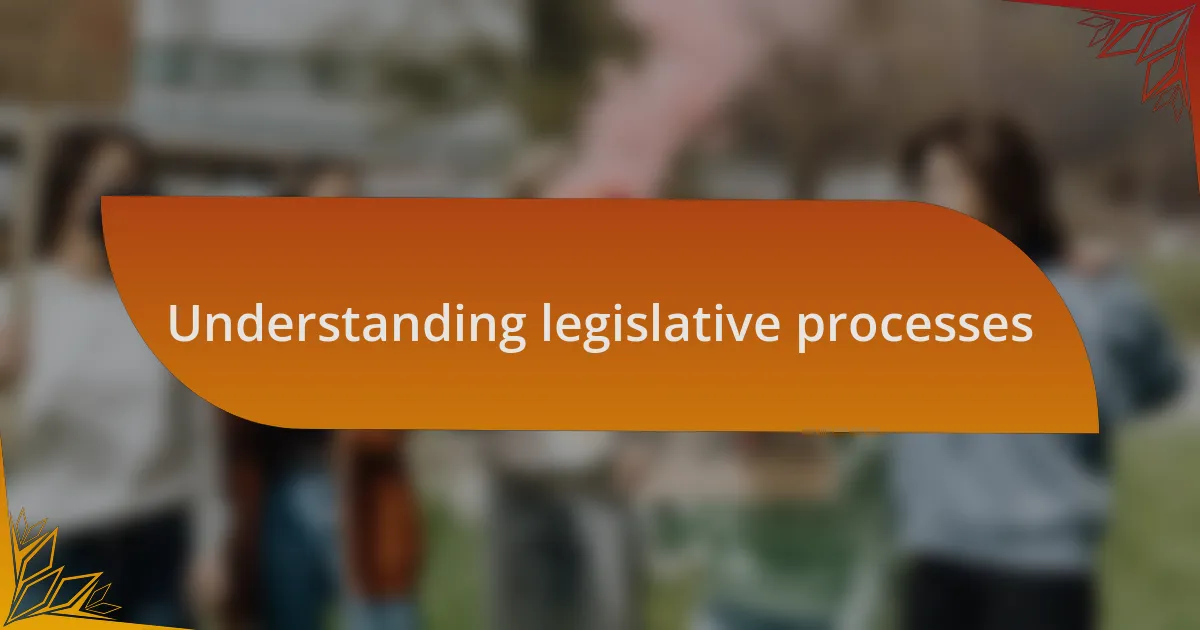
Understanding legislative processes
Understanding legislative processes often feels like navigating a maze, doesn’t it? I remember attending a session in my local government where passionate voices clashed over a proposed bill. That experience highlighted for me just how complex these processes can be—an intricate dance of negotiation, compromise, and democratic engagement.
At its core, the legislative process is about translating public concerns into actionable laws. I once witnessed a passionate advocate outline the dire needs of their community in a public hearing. It struck me that each step, from drafting to voting, is steeped in the hopes and fears of the people it aims to serve. How often do we stop to consider the emotional weight behind each piece of legislation, the lives shaped by these decisions?
Engaging with legislative processes is not just about understanding the technical aspects but also the human stories intertwined within them. Reflecting on my own experiences, I’ve realized that every bill carries the potential to impact lives—an idea that profoundly changes how we view politics. Why do we sometimes feel disconnected from these processes? Perhaps it’s because we don’t see ourselves represented in those decision-making rooms.
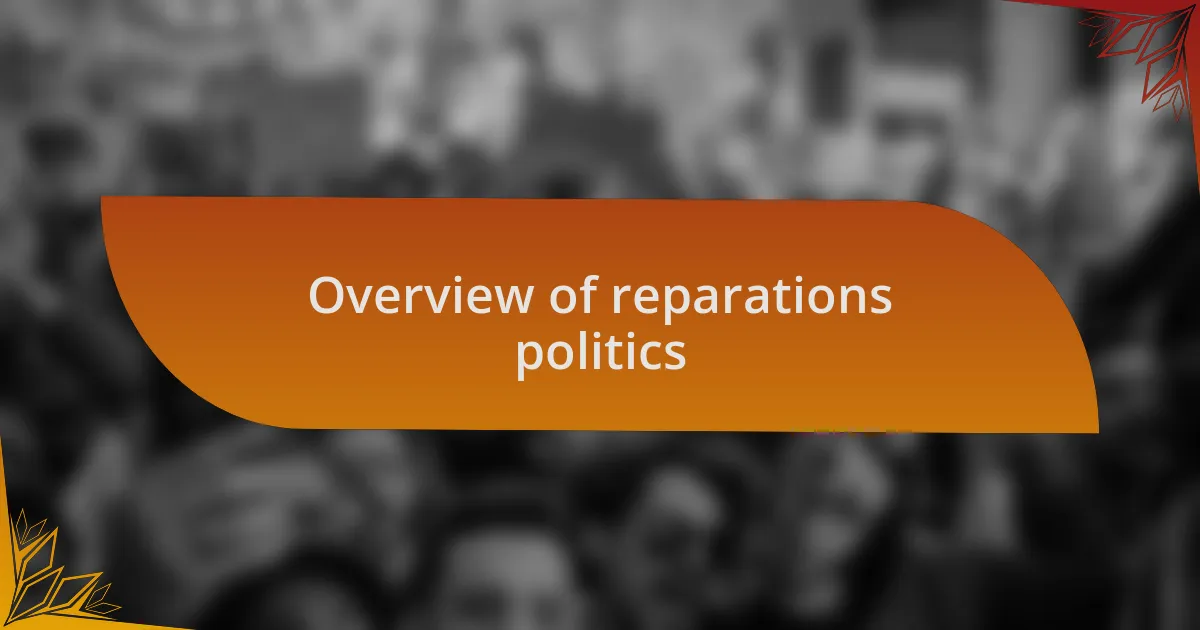
Overview of reparations politics
Reparations politics sits at the intersection of historical injustice and contemporary legal frameworks. I recall attending a community forum where individuals passionately recounted the intergenerational trauma of systemic racism. Listening to their stories made it clear that reparations is not just a financial reparative measure; it embodies acknowledgment and healing for marginalized communities. How can we truly reconcile past injustices without addressing the deep-rooted wounds they have caused?
The conversation around reparations challenges us to reevaluate our understanding of justice. I once spoke with an activist who emphasized that for many, the fight for reparations is about dignity and recognition, not just compensation. It’s a complex dialogue that forces us to question the societal structures we take for granted. When we consider the weight of history on current policies, how do we navigate the path toward accountability while fostering unity?
As public awareness grows, so does the political momentum for reparative measures. I remember examining the testimonies presented in legislative hearings where citizens shared their lived experiences, advocating for restitution. Each narrative added a layer of urgency to the conversation, revealing that reparations politics is fundamentally about listening and responding to the cries for justice in a system that has long ignored them. What happens when we ignore these stories? The answer is simple: we risk prolonging the pain and perpetuating injustice.
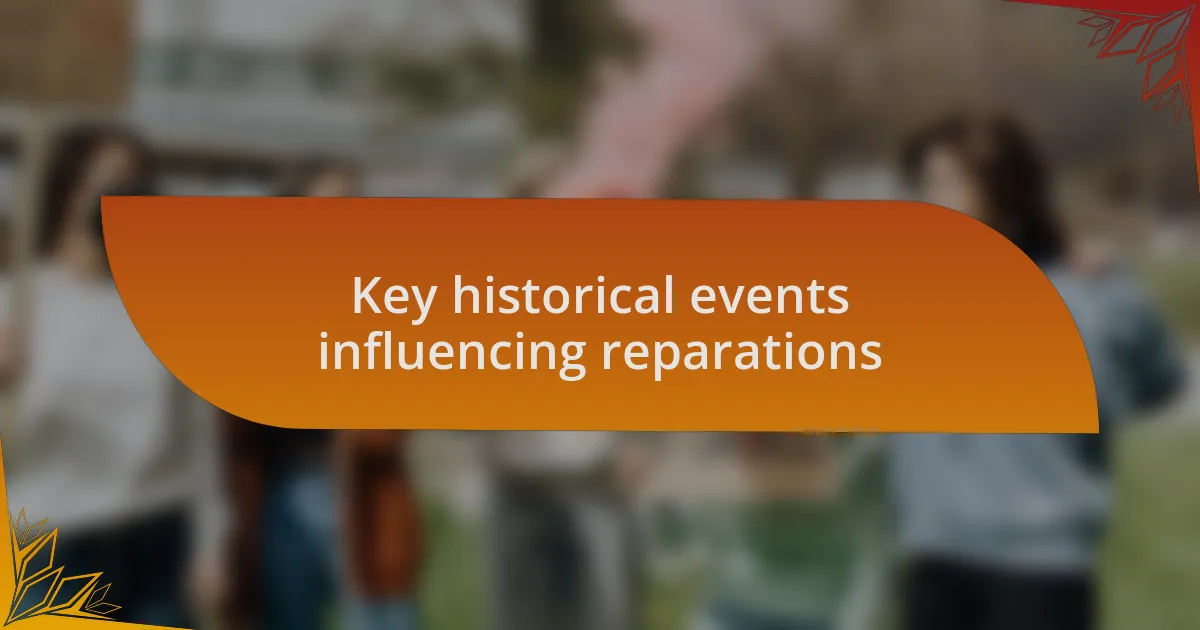
Key historical events influencing reparations
The establishment of the Homestead Act in 1862 significantly influenced reparations discussions, as it granted land to settlers while systematically denying access to Black citizens. This disparity planted seeds of inequality that still affect land ownership today. When I encountered the stark contrast between land wealth in my community and the historical barriers faced by African Americans, it occurred to me how pivotal such policies were in shaping current socioeconomic divides. Can we truly understand today’s reparations conversation without acknowledging this history of exclusion?
During the Civil Rights Movement, the demands for equality and justice gained national attention, yet reparations were often sidelined. I recall reading testimonies from activists who tirelessly advocated for compensation for the legacies of slavery and Jim Crow laws. These voices energized a movement that sought not just civil rights, but also the recognition of historical wrongs. Reflecting on their struggles, I find myself asking: How can we engage meaningfully with these calls for justice without confronting the painful legacies of our past?
In recent years, the 2020 racial justice protests marked a pivotal moment in reparations politics. Coming together with others from various backgrounds to march and voice demands for systemic change was eye-opening. It made me realize that the collective trauma of racial injustice had been brought to the forefront of public consciousness, pushing reparations into mainstream dialogue. How can we ignore the urgency of this moment when the echoes of history call for recognition and restitution?
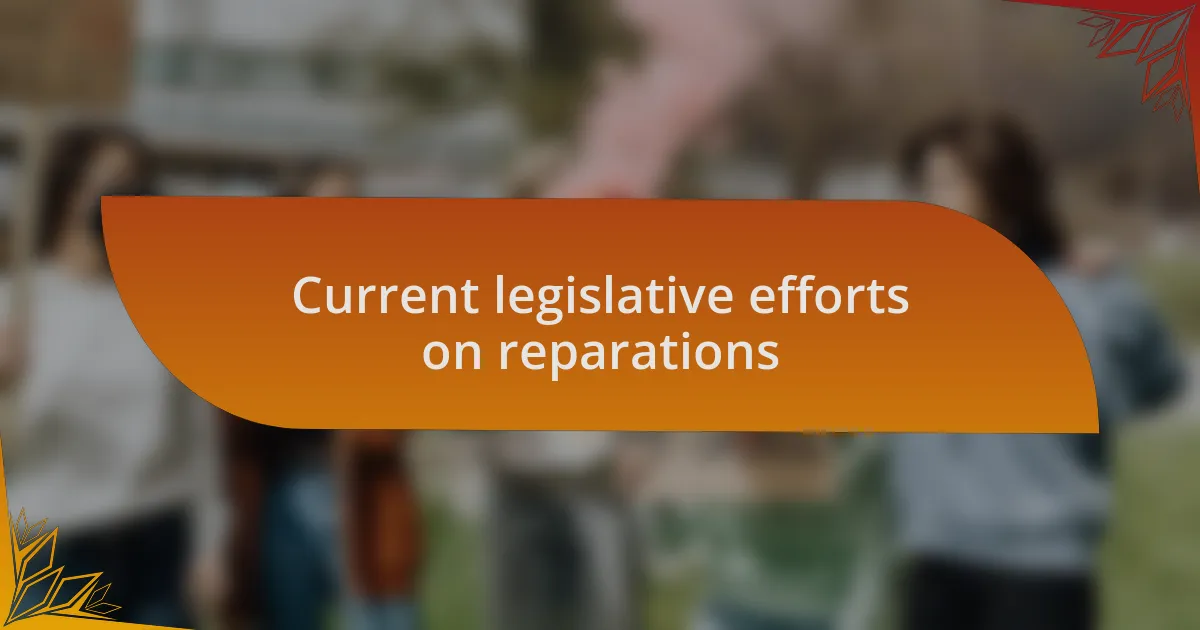
Current legislative efforts on reparations
Current legislative efforts on reparations have gained momentum in several states. For instance, California’s state legislature has been working on Assembly Bill 3121, which would establish a task force to study and recommend reparations for African Americans. When I learned about this initiative, I felt a surge of hope; it felt like a real acknowledgment of longstanding injustices. Isn’t it fascinating how a legislative proposal can resonate deeply with those of us who have felt the weight of history?
In addition to California, New York’s recent Reparations Study Bill aims to investigate the impact of slavery and its aftermath while exploring avenues for reparative justice. As I reflect on the implications of such legislative efforts, I often think about the lives they potentially impact. Could these discussions finally provide a platform for healing and closure for many? It’s clear that policymakers are starting to recognize the multidimensional nature of reparations, and this is just the beginning.
Moreover, grassroots movements are actively shaping these conversations, urging lawmakers to seize this moment. For example, organizations across the country are pushing for reparations legislation at local and national levels. I remember attending a community meeting where passionate advocates discussed the urgency of reparations, inspiring me to think about the power of collective advocacy. How could we harness that energy into meaningful, transformational change? The enthusiasm is palpable, and it is sparking a national dialogue that we cannot afford to overlook.
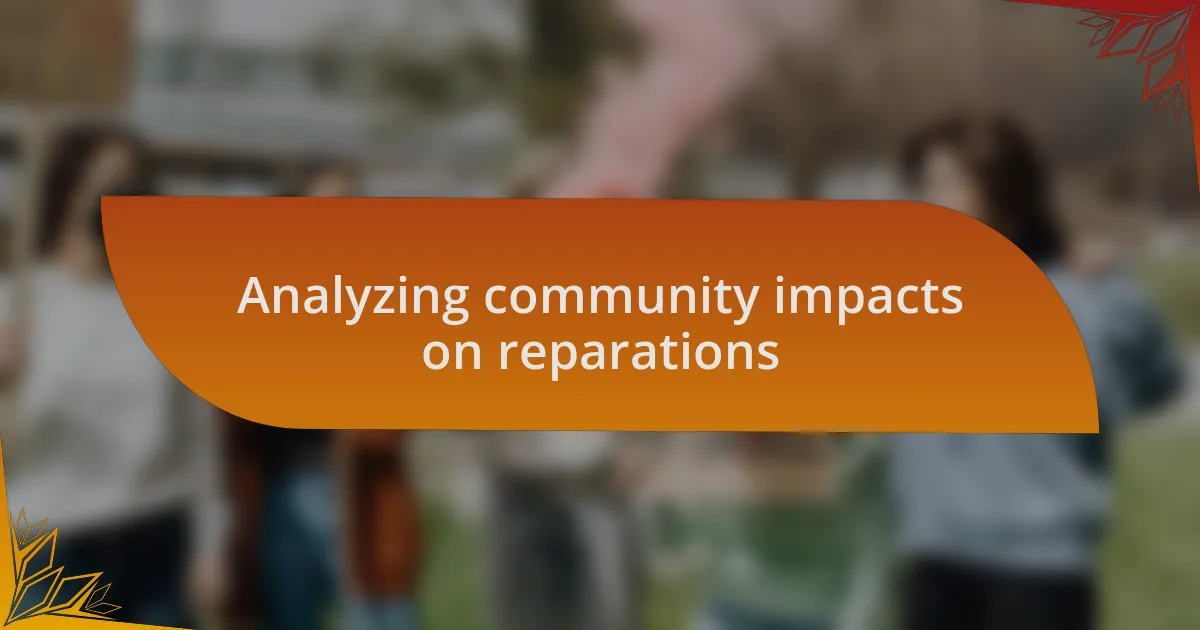
Analyzing community impacts on reparations
Analyzing the community impacts of reparations unveils a multifaceted landscape where historical grievances intertwine with contemporary social dynamics. I recall sitting in a local community forum, where I witnessed firsthand how discussions around reparations resonated not just with those directly affected, but also with younger generations eager to learn about systemic inequalities. It made me ponder: How can we facilitate intergenerational conversations that deepen our understanding of these issues?
Moreover, the emotional reactions from community members often highlight the longing for recognition and healing. Hearing veterans of civil rights movements speak passionately about the need for reparation measures reminded me of the weight of responsibility the current generation carries. Are we willing to bridge the gap between what has been lost and the potential for future reconciliation? Such moments reinforce the idea that reparations are not merely financial; they embody a significant social acknowledgment that many communities have been deprived of for far too long.
As I delve deeper into this topic, I recognize that the implications of reparations extend beyond economic compensation. They ripple through neighborhoods, affecting local cultures and identities. During a discussion with a community elder, I learned how initiatives aimed at reparations could restore historical sites and cultures, fostering a renewed sense of pride. Isn’t it empowering to think that reparations could pave the way for rebuilding, revitalizing communities and, ultimately, transforming narratives? The way forward must be built on collective memory, local impact, and genuine understanding.
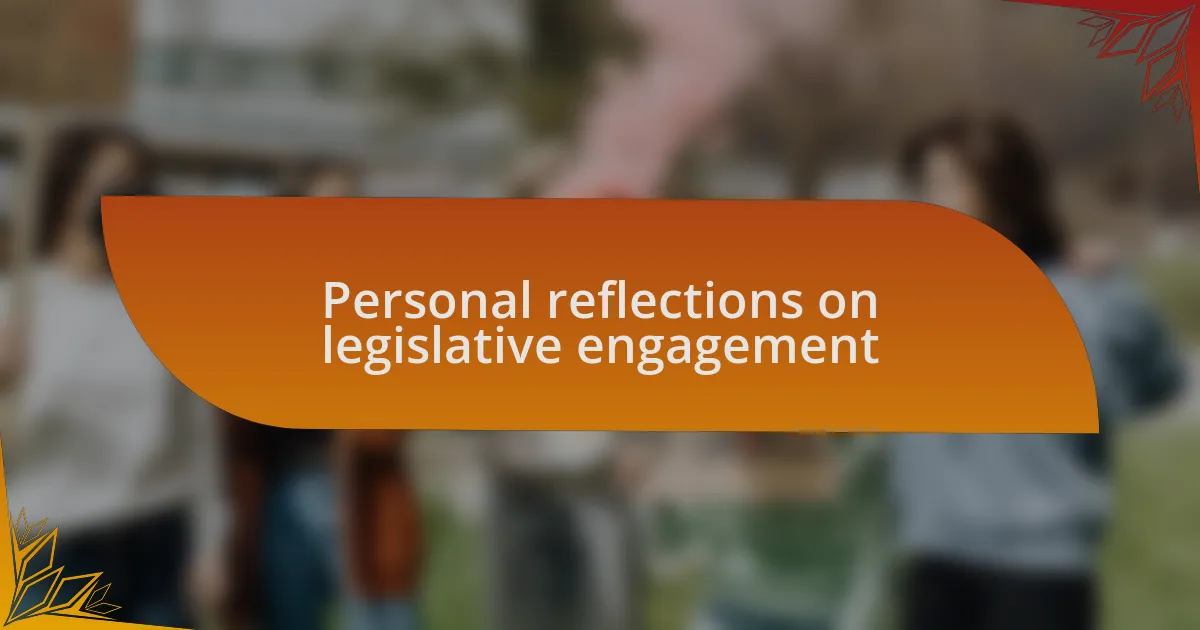
Personal reflections on legislative engagement
Personal engagement with the legislative process has been eye-opening for me. I remember attending a city council meeting where reparations discussions were on the agenda; it was striking to see how passionate individuals could sway opinions. I wondered: how often do we underestimate the power of our voices within such formal structures?
One experience that sticks with me is when I advocated for a resolution acknowledging historical injustices. Standing before elected officials, I felt a mix of anxiety and purpose. In that moment, it was clear that personal stories make legislation resonate—they bring abstract policies down to earth. They remind lawmakers that these are not just numbers or statistics; they are lives impacted by historical choices.
Reflecting on these moments, I’ve come to appreciate the importance of grassroots advocacy. When communities mobilize, they can shift the narrative around reparations, demanding accountability and recognition. I often find myself asking: what if every citizen felt empowered to engage in these conversations? It’s a transformative thought that underscores the potential of civic involvement in shaping policies that matter.
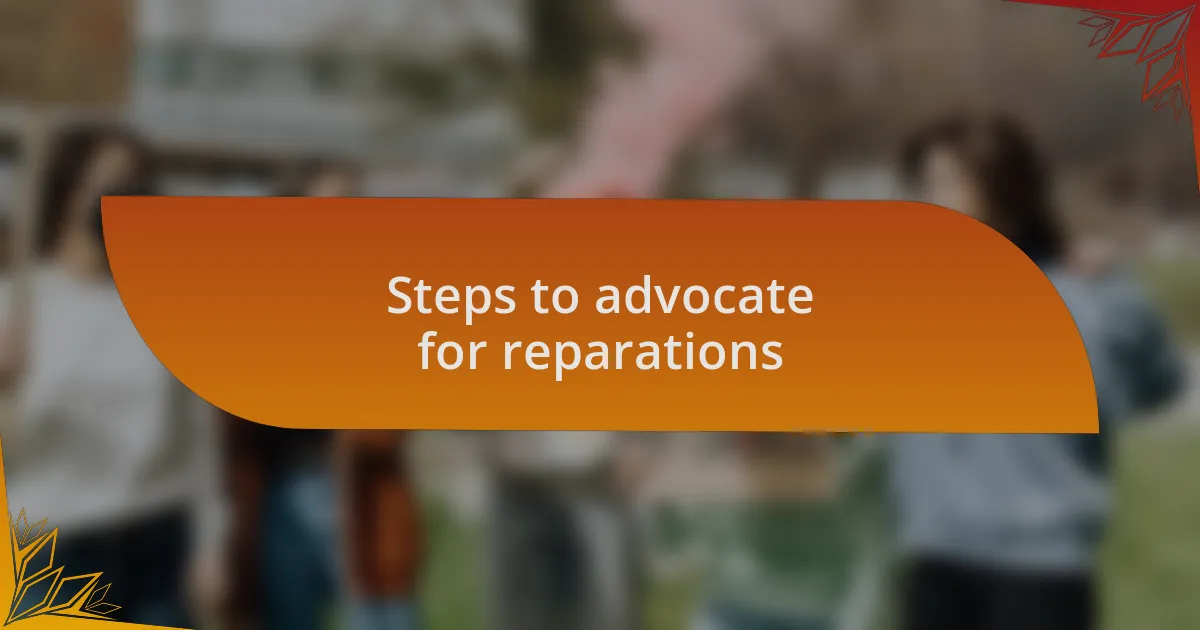
Steps to advocate for reparations
One effective step in advocating for reparations is to educate yourself and your community on the historical context and current implications of injustices. I recall organizing a small workshop in my neighborhood where we discussed the legacy of systemic oppression. It was incredible to see how understanding our shared history sparked passionate dialogues and prompted individuals to consider their role in this advocacy.
Once you’ve built that foundational knowledge, reaching out to local representatives becomes crucial. I’ve found that a well-crafted email or a personal meeting where you share compelling stories can make all the difference. It’s not just about informing them; it’s about connecting with them on a human level. Have you ever thought about how personal narratives can shift the perspective of those in power? I remember one legislator telling me that hearing stories from constituents made the issue feel less abstract and more urgent.
Lastly, collaborating with established organizations that focus on reparations can amplify your efforts. When I partnered with a local advocacy group, I noticed our voices combined had a far greater impact. Together, we organized rallies, petition drives, and educational events that brought more people into the fold. What struck me the most was not just the scale of our actions, but the deep sense of community it fostered. It was a reminder that being part of a collective effort can make a daunting task feel attainable.